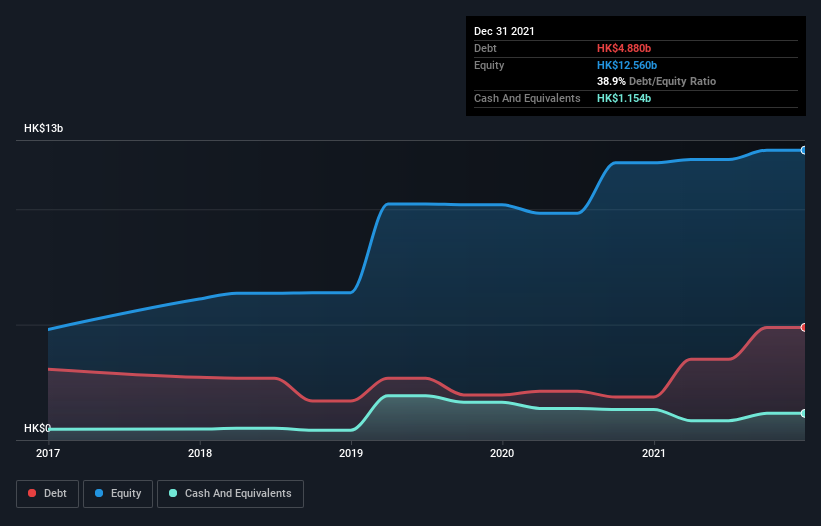- Hong Kong
- /
- Renewable Energy
- /
- SEHK:3868
These 4 Measures Indicate That Xinyi Energy Holdings (HKG:3868) Is Using Debt Reasonably Well
Some say volatility, rather than debt, is the best way to think about risk as an investor, but Warren Buffett famously said that 'Volatility is far from synonymous with risk.' When we think about how risky a company is, we always like to look at its use of debt, since debt overload can lead to ruin. Importantly, Xinyi Energy Holdings Limited (HKG:3868) does carry debt. But is this debt a concern to shareholders?
Why Does Debt Bring Risk?
Debt assists a business until the business has trouble paying it off, either with new capital or with free cash flow. In the worst case scenario, a company can go bankrupt if it cannot pay its creditors. However, a more usual (but still expensive) situation is where a company must dilute shareholders at a cheap share price simply to get debt under control. By replacing dilution, though, debt can be an extremely good tool for businesses that need capital to invest in growth at high rates of return. The first step when considering a company's debt levels is to consider its cash and debt together.
Check out our latest analysis for Xinyi Energy Holdings
How Much Debt Does Xinyi Energy Holdings Carry?
You can click the graphic below for the historical numbers, but it shows that as of December 2021 Xinyi Energy Holdings had HK$4.88b of debt, an increase on HK$1.86b, over one year. However, it does have HK$1.15b in cash offsetting this, leading to net debt of about HK$3.73b.

How Strong Is Xinyi Energy Holdings' Balance Sheet?
The latest balance sheet data shows that Xinyi Energy Holdings had liabilities of HK$4.70b due within a year, and liabilities of HK$3.94b falling due after that. Offsetting this, it had HK$1.15b in cash and HK$4.97b in receivables that were due within 12 months. So its liabilities outweigh the sum of its cash and (near-term) receivables by HK$2.52b.
Since publicly traded Xinyi Energy Holdings shares are worth a total of HK$28.8b, it seems unlikely that this level of liabilities would be a major threat. However, we do think it is worth keeping an eye on its balance sheet strength, as it may change over time.
In order to size up a company's debt relative to its earnings, we calculate its net debt divided by its earnings before interest, tax, depreciation, and amortization (EBITDA) and its earnings before interest and tax (EBIT) divided by its interest expense (its interest cover). The advantage of this approach is that we take into account both the absolute quantum of debt (with net debt to EBITDA) and the actual interest expenses associated with that debt (with its interest cover ratio).
Xinyi Energy Holdings's net debt of 1.8 times EBITDA suggests graceful use of debt. And the alluring interest cover (EBIT of 9.7 times interest expense) certainly does not do anything to dispel this impression. It is well worth noting that Xinyi Energy Holdings's EBIT shot up like bamboo after rain, gaining 35% in the last twelve months. That'll make it easier to manage its debt. There's no doubt that we learn most about debt from the balance sheet. But ultimately the future profitability of the business will decide if Xinyi Energy Holdings can strengthen its balance sheet over time. So if you're focused on the future you can check out this free report showing analyst profit forecasts.
Finally, while the tax-man may adore accounting profits, lenders only accept cold hard cash. So we always check how much of that EBIT is translated into free cash flow. In the last three years, Xinyi Energy Holdings's free cash flow amounted to 48% of its EBIT, less than we'd expect. That's not great, when it comes to paying down debt.
Our View
Xinyi Energy Holdings's EBIT growth rate suggests it can handle its debt as easily as Cristiano Ronaldo could score a goal against an under 14's goalkeeper. And the good news does not stop there, as its interest cover also supports that impression! When we consider the range of factors above, it looks like Xinyi Energy Holdings is pretty sensible with its use of debt. While that brings some risk, it can also enhance returns for shareholders. The balance sheet is clearly the area to focus on when you are analysing debt. However, not all investment risk resides within the balance sheet - far from it. For instance, we've identified 1 warning sign for Xinyi Energy Holdings that you should be aware of.
Of course, if you're the type of investor who prefers buying stocks without the burden of debt, then don't hesitate to discover our exclusive list of net cash growth stocks, today.
New: AI Stock Screener & Alerts
Our new AI Stock Screener scans the market every day to uncover opportunities.
• Dividend Powerhouses (3%+ Yield)
• Undervalued Small Caps with Insider Buying
• High growth Tech and AI Companies
Or build your own from over 50 metrics.
Have feedback on this article? Concerned about the content? Get in touch with us directly. Alternatively, email editorial-team (at) simplywallst.com.
This article by Simply Wall St is general in nature. We provide commentary based on historical data and analyst forecasts only using an unbiased methodology and our articles are not intended to be financial advice. It does not constitute a recommendation to buy or sell any stock, and does not take account of your objectives, or your financial situation. We aim to bring you long-term focused analysis driven by fundamental data. Note that our analysis may not factor in the latest price-sensitive company announcements or qualitative material. Simply Wall St has no position in any stocks mentioned.
About SEHK:3868
Xinyi Energy Holdings
An investment holding company, owns, operates, and manages solar farms in the People's Republic of China.
Proven track record and fair value.
Similar Companies
Market Insights
Community Narratives



